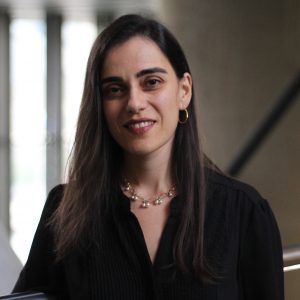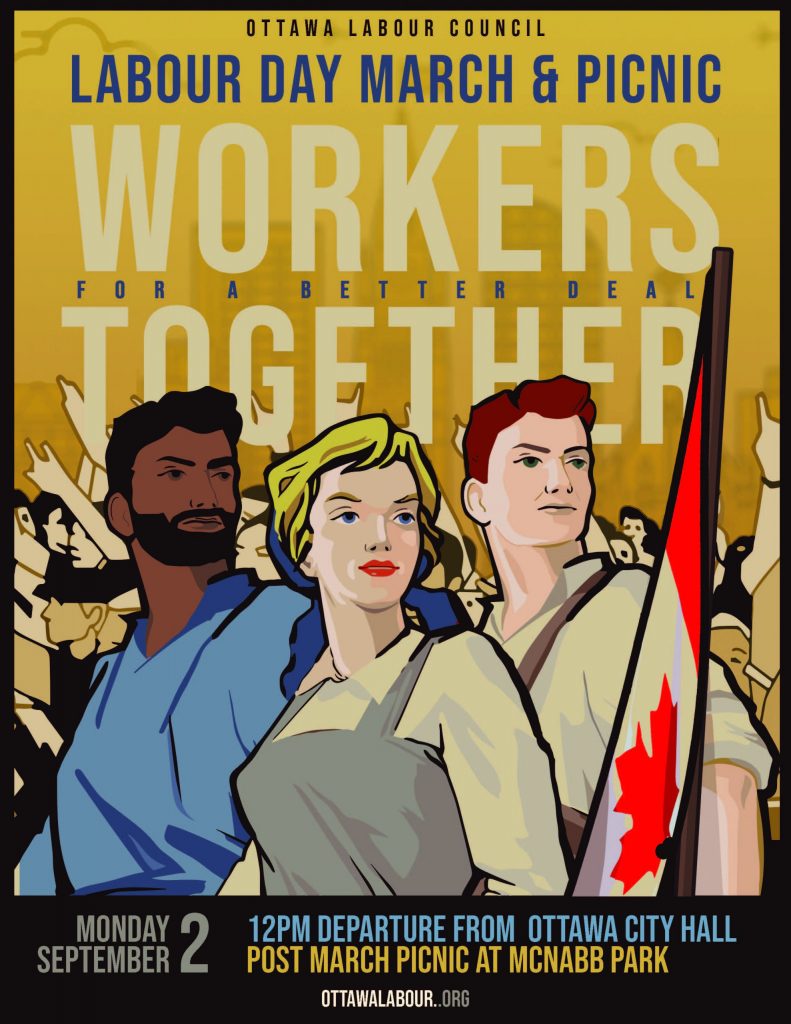The Communiqué: Volume 46, No. 20 – July 12, 2024
In this Issue:
- A Note from CUASA President Dominique Marshall
- Meet Your New Officers: Nadine Ijaz, Vice President
- Introducing CUASA’s New MSCO, Brittainy Bonnis
- CAUT Aboriginal Academic Staff Conference, October 4 and 5
- Save the date: Labour Day March and Picnic, September 2
- 2024 OFL/AIL Jack Layton Labour Post-Secondary Scholarship
- Updates from OCUFA and CAUT
- Get involved: Volunteer opportunities at CUASA
A Note from CUASA President Dominique Marshall
Dear CUASA friends,
After 16 months in the job, I welcome the opportunity of my recent election to continue to be the President of our Faculty Association for another two years! I aim to maintain and achieve what colleagues fairly deserve and desire, with the following goals in mind.
First, out of the approximately 1,000 of us who are automatically members of CUASA as a bargaining unit, and benefit from its collective bargaining, there remains approximately 250 who have not filled the membership form, which means that you will have less say in CUASA’s orientations, governance, actions and discussions, outside of strike and ratification votes. I was one of this group for too long a time, partly for lack of understanding of this technicality. To face the recent challenges of the academic world with as much power as possible, CUASA may not have gigantic resources and PR operations, but it has the numbers. So please consider filling the form if you have not already done so.
Second, to make a real difference in ensuring an education of quality at Carleton, the knowledge, energies, networks and leverage of 30 professional librarians, 131 teaching professors and 836 professors is needed; in other words, the more the union is based on the meaningful participation of its members, the better. As a financially secure white-collar worker, writing and teaching in a field I value, I was never too sure of what my participation in my trade union would mean. In my own work on the history of human rights and humanitarian aid, I witnessed how unions have long provided financial and organizational stability and sustainable organizational resources to social movements, and how this has become more so after decades of conservative public budgets and privatizations of public services. In universities in particular, recent years have made it clearer to me that collegial governance cannot be entrusted to boards of governors, robots or university senates alone. Faculty unions are essential to prevent the current erosion of the place of academic staff and students in discussions about education, to ensure that the number of full-time professors and librarians required to transmit knowledge meaningfully and train the next generation of scholars and scientists is adequate, to watch over threats to the freedom to learn and research freely, to safeguard the public nature of universities, to guarantee the rights to equity in employment, and to work without harming the environment. I would like to use my time as President to bring colleagues who now feel the same as I did then to come to see how their individual engagement can matter.
From where I stand as President of the Association, this means making sure that, in a time when librarians and professors are all too busy, it is possible to be involved in CUASA’s leadership and structure with a sense that their hours are well spent, as they contribute to important decisions for themselves and for their communities, and that their voluntary work will be well supported. For this, my tasks as President involve coordinating and planning the year to ensure that the union’s budget is tight, hefty, and clear to all; that the 6-people-strong permanent staff is organized efficiently and responsively; that the work of volunteers is transmitted well from one generation of officers to the next; and that the efforts of the twelve elected officers and of the members of Council are well resourced, valued, and coordinated. It also means ensuring that CUASA staff and volunteers listen to members the best they can, not only to be more trusted to consider individual problems tactfully and provide good courses of action, but also to gather collective hopes, sorrows and ideas widely for the ongoing round of collective bargaining.
Third, until recently, I had little idea of the wealth of external allies and resources on which CUASA can count and, in return, of the possibilities that a relatively rich and strong union like this one can have to support change in the region and the post-secondary sector. Maintaining and strengthening CUASA’s place and role in CAUT, OCUFA, ODLC, is essential. Over the years, as member of these coalitions, we have shared, updated and accumulated reserves of knowledge about demystifying university budgets, exposing and remedying inequities, scrutinizing political and institutional reforms at all levels of academic life, conducting collective action, and facing renewed challenges. The same is true for CUASA’s joint work with precarious academic workers, with students and their families, with the community.
The team of staff and volunteers assembled to shepherd the Association in the coming academic year has already been a joy to work with, and we are looking forward to working with you all in 2024-2025.
All the best,
Dominique Marshall
CUASA President
In memory of Jane F. McAveley, who passed away this week, and whose influence on the culture of Canadian Faculty Associations will be long felt. See the recent New York Times tribute, and her interview by CAUT three years ago.
Meet Your New Officers: Nadine Ijaz, Vice President
Over the Summer, we will introduce the new members of CUASA’s Steering Committee, who began their mandate on July 1, 2024. In this update, we’d like to introduce Nadine, who will be the Vice President.

Nadine Ijaz is an Assistant Professor in the Department of Law and Legal Studies, and Director of the Traditional, Complementary and Integrative Medicine Lab. Her research focuses on epistemic, evidentiary and governance issues related to non-conventional therapeutic systems and practices worldwide.
As Vice President, Nadine will be responsible for chairing meetings of CUASA Council and the general membership, chairing the Staff Relations Committee, and supporting the work of the President by assisting in carrying out her duties.
Welcome, Nadine!
Introducing CUASA’s New MSCO, Brittainy Bonnis
CUASA is pleased to welcome Brittainy Bonnis to the CUASA staff team. Brittainy joined us this week as the new Member Services & Communications Officer on a one-year contract, with the possibility of renewal.

As the MSCO, Brittainy’s primary responsibilities include day-to-day services to members, member development, mobilization and organization, and internal and external communications on behalf of the Association.
Brittainy brings their recent experience as a graduate student union executive and a member of a highly successful bargaining team to their new position. Committed to clear and accessible communications, they look forward to supporting the membership and keeping them and the larger community informed about the work of the Association.
Brittainy holds a Bachelor of Arts in Communications from Laurentian University, a Master’s Degree in Media Studies from Western, and is currently pursuing a PhD in Culture Studies at Queen’s.
Welcome, Brittainy!
CAUT Aboriginal Academic Staff Conference, October 4 and 5
On October 4 and 5, CAUT is organizing the 2024 Aboriginal Academic Staff Conference in Regina, Saskatchewan, to take stock of accomplishments and discuss Indigenous representation and recognition of Indigenous knowledge in post-secondary education.
The theme of the conference is Beyond Words: Translating Indigenization of the Academy Into Practice:
The journey toward Indigenizing the academy, beginning with the implementation of the Truth and Reconciliation Commission’s calls to action, has been underway for close to 10 years. While much progress has been made, it is clear more work lies ahead to transform the Commission’s call to Indigenize universities and colleges into practice.
The 2024 CAUT Aboriginal Academic Staff Conference will be an important opportunity for Indigenous scholars and their non-Indigenous allies to join with one another in the spirit of reconciliation, build networks and peer support, take stock of what has been accomplished, and identify what more needs to be done. Topics of discussion will include the experiences of Indigenous teachers and researchers, how institutions can best navigate claims of Indigenous identity, and how academic staff associations have worked, through bargaining and advocacy, to improve Indigenous representation and recognition of Indigenous knowledge in post-secondary education.
CUASA has decided to pay for the conference registration, travel, and accommodation costs for two Indigenous members who are interested in attending. If you are interested, please contact our Equity and Member Services Officer, Max López, at [email protected] by July 31. If we receive interest from more than two Indigenous CUASA members, we will do a draw from the names of those interested to choose the two attendees.
Save the date: Labour Day March and Picnic, September 2
Save the date for the Ottawa and District Labour Council (ODLC) Labour Day 2024 march and picnic!

The March begin at 12:00pm, starting at Elgin and Lisgar Streets (by Ottawa City Hall) and going to McNabb Park. The picnic will run from 1:00-4:00pm at McNabb Park (corner of Bronson and Gladstone Avenues).
Come join this free day of family fun and celebration for all, including a barbecue, live music, face painting, and a moon bounce.
2024 OFL/AIL Jack Layton Labour Post-Secondary Scholarship
The Ontario Federation of Labour (OFL) will once again be giving out the OFL/AIL Jack Layton Labour Post-Secondary Scholarship in partnership with American Income Life (AIL) Canada.
Two OFL members (which all CUASA members are), or the children of members, will be selected from a pool of applicants to each receive a scholarship in the amount of $2,500 to support them as they enter their first year of full-time post-secondary study in September 2024. The scholarships will be awarded in honour of distinguished trade union activists who have made a significant contribution to the life and growth of the labour movement in Ontario.
For eligibility and criteria, please see the application package. The deadline to apply is September 10, 2024.
Updates from OCUFA and CAUT
New agreement for McMaster Librarians
Congratulations to the McMaster University Academic Librarians’ Association (MUALA) for recently ratifying a new collective agreement! Members made significant monetary gains in keeping with their bargaining priorities of bringing McMaster librarians’ working conditions closer to the average for academic librarians across Ontario, significant benefits gains, and improvements for members with contractually limited appointments.
Read the full update from OCUFA.
University of Waterloo’s attempt to break up protest alarming, says national teachers’ group
The Canadian Association of University Teachers is alarmed over the University of Waterloo’s attempts to break up a student encampment on campus.
Last week, the university administration issued a second trespass notice against protesters. It has since sought a court injunction to clear the encampment and filed a statement of claim demanding $1.5 million in damages from those involved in the protest.
Read the full statement from CAUT.
CAUT July Advocate
Every month CAUT issues a newsletter with the latest CAUT and post-secondary education sector news. In the July issue:
- Legislation excluding public post-secondary education from CCAA receives royal assent
- Court grants U of T injunction to remove encampment
- Foreign interference bill rushed through parliament
- CAUT’s virtual courses for the 2024-25 academic year
- CAUT Aboriginal Academic Staff Conference
- Share your insights with the CAUT Bulletin
- AMPL suspends strike
Get involved: Volunteer opportunities at CUASA
The Association is as strong as its membership, so we count on the time, ideas and commitment of members to achieve and update CUASA’s goals. If you’d like to contribute to CUASA’s work and positions, here are some ways you can help:
… join the CUASA Steering Committee
We are still accepting nominations for the following positions (click on the position title to view the description):
All nominations must be made using the form found here. All nomination forms must include the signatures of the nominee and two Association members as nominators. Please send completed forms to [email protected].
… volunteer on the Grievance Policy and Administration Committee
This Committee helps to set CUASA policy on how to handle member grievances, and works with CUASA staff to support members during the grievance process. The committee meets once a month during the academic year.
… serve as a member of Anti-Racism Working Group
This Working Group is open to any CUASA member interested in addressing the issue of racism at Carleton. It usually meets once a month during the academic year.
… join one of our Caucus Groups
CUASA’s 2SLBGTQIA+ Pride Caucus and Disability Caucus are now meeting regularly, and we are happy to welcome new members. These caucus groups are intended to be a way for people from equity-seeking groups to find community connections, socialize, organize, support one another, and share ideas with each other and with CUASA. These groups usually meet once a month.
For more information, or to volunteer for any of these positions, please contact the CUASA Office at [email protected]. If you are interested in participating in a caucus group, please contact our Equity and Member Services Officer, Max López, at [email protected] for more details.
The Communiqué is published by the Carleton University Academic Staff Association. Past issues are archived on our website at CUASA.ca.
The Communiqué publishes CUASA-related news and information for our members.
We want to hear from you! Get in touch, by email, social media, phone, or by scheduling a meeting.
We read everything you send, and thank all of those who have contributed suggestions.
© 2024 Carleton University Academic Staff Association





